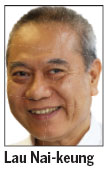Lessons for HK from Boston bombing
Updated: 2013-04-23 07:07
By Lau Nai-keung(HK Edition)
|
|||||||

Last week's explosion on the finish line of the world-famous Boston Marathon, which killed three people and injured 176 including a Chinese female student, was a tragedy. Right now, people are still investigating the motive behind the attack and whether organized terrorist groups are involved, but some straightforward lessons have already emerged.
Patriots in Hong Kong are always suspicious about "foreign forces" behind the dissidents' mobilization. They are concerned whether or not people such as Martin Lee Chu-ming has been talking to foreign officials, or if the dissidents' organizations have received any financial support from abroad. The Boston bombing served as a timely reminder that foreign influences now more often than not take on totally different forms.
From information gathered so far it seems that the suspects of the Boston bombing, the Chechen brothers, are amateurs. Any link, if any between the suspects and a state sponsor or a professional terrorist group such as al-Qaeda, will likely be ideological rather than operational. Despite being amateurs, grassroots militants like them clearly still pose a significant threat. Analysts from Stratfor, a private intelligence company believe it is very likely that the brothers had read and studied al-Qaeda's Inspire magazine which aims at fomenting grassroots terrorism in the West.
Dissidents in Hong Kong are of course not terrorists, but the analogy is not without merit when it comes to linkage with foreign "masterminds". If Inspire magazine can teach people in the West to make bombs and conduct terrorist acts, there certainly is no lack of materials on how to conduct "color revolutions" or "civil disobedience". The only difference is that in the US, you get caught if you are in possession of Inspire magazine; whereas in Hong Kong, you get an A in Liberal Studies with a project assignment in support of activism to overthrow the Communist Party on the Chinese mainland.
The ideological roots of our dissidents are from abroad, but over the years it has very much been localized. At the same time, operationally and financially the dissidents are now self-sustainable. Funding comes not directly through the CIA, but from local donations, or revenue from their bestsellers and movies (such as Stephen Shiu Yeuk-yuen's 3D Sex and Zen: Extreme Ecstasy).
As these terrorist acts become amateurish and decentralized, it gets increasingly difficult to access the motives behind them. It is reported that one of the Boston bombers has visited Chechnya and Dagestan, which are both predominantly Muslim republics in the north Caucasus region of Russia with active militant separatist movements. It would have been easy to explain if they bombed a Russian target. After all Chechnya and Russia fought two wars, and many Chechens were brutally killed. Muslim extremists have an issue with the US, but who would have thought that the threat came from Chechens.
After Sept 11, people in the US began to ask "why do they hate us". Countries around the world stepped up their security measures, especially in public areas. The Chinese mainland government has installed baggage scanners in almost every subway stations. Amid all this, people in Hong Kong seem to think that they are exempt from the heightened risks. Somehow, nobody is going to hate us for whatever reasons. These Hong Kong people forget that sometimes there is no logic to amateur terrorists who learn their trade reading a magazine. Our city only has a few extremists who believe in separatism, but they too can wreck havoc in Hong Kong if they think that can further their cause.
I once wrote in the Hong Kong Economic Journal about how we are vulnerable to terrorism because we still have not enacted our national security law; I was ridiculed and my column was taken away. I will keep on raising this issue, as it is better safe than sorry.
Our President Xi Jinping recently made a remark that "to forge iron, one must be strong". Instead of investigating the "foreign forces" behind the dissidents, we should focus on solving our social problems and building up our own support base. At the same time, people in Hong Kong should be reminded that our city is not risk-free to extremism. The national security law is not about protecting the central government; it is first and foremost about protecting us.
The author is a member of the Commission on Strategic Development.
(HK Edition 04/23/2013 page1)